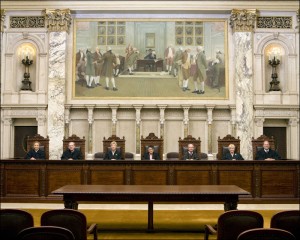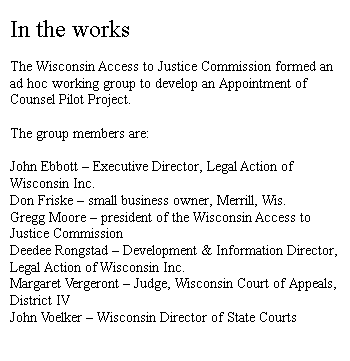State’s high court denies civil appointment petition, encourages pilot
By: Jack Zemlicka, [email protected]//January 19, 2012//
State’s high court denies civil appointment petition, encourages pilot
By: Jack Zemlicka, [email protected]//January 19, 2012//

On Thursday, the Wisconsin Supreme Court unanimously denied a petition seeking appointment of civil attorneys at public expense to poor people, but informally endorsed creation of a small-scale pilot project.
While the justices cited the petition as overly broad and likely expensive to counties — including estimates of $56 million per year — the court favored a pilot project as a way to analyze the value of appointed counsel.
“This is a start,” Chief Justice Shirley Abrahamson said. “Let’s let it go and see what they do.”
But progress in developing a project outline to include the types of civil cases subject to appointment and the number of counties targeted for participation is still in its infancy, said Gregg Moore, president of the State Bar of Wisconsin’s Access to Justice Commission, which is spearheading the pilot.
He said those questions need to be answered before the Commission can approach financial partners with an estimated cost of the project.
The Commission formed a six-member ad hoc work group to develop an initial project plan. Those findings will be discussed with the justices at a March 12 meeting.
“We have to have results that are going to mean something,” Moore said, “to be able to go to policy makers and secure funding.”
 Three potential sources of seed money will be explored, Moore said: the State Bar’s reserve set aside for the Commission, the Supreme Court and private foundations.
Three potential sources of seed money will be explored, Moore said: the State Bar’s reserve set aside for the Commission, the Supreme Court and private foundations.
When the Commission formed two years ago, the State Bar allotted $300,000 to finance the first three years of operation.
Moore estimated that about $200,000 of the money remains and it could be enough to launch a pilot program, with the expectation of at least 100 appointments and a minimum cost of $1,000 per case.
“Realistically,” he said, “I can’t imagine the bar is in any kid of position to do more than that, and maybe even less.”
Abrahamson and other justices said it is unlikely that the court’s budget would have money available for the project in the short-term, but that could change in the future.
Moore said the primary goal of the working group is to develop a program that will provide a meaningful sample size of cases to emphasize the unmet legal needs of the poor in Wisconsin.
Whether the initial pilot plan, or its results, will persuade public or private entities to invest is an unknown, Moore said.
“We won’t know until we ask the question,” he said. “I don’t know what results are going to be and I’m not going to prejudge them at this point.”
Legal News
- State Bar leaders remain deeply divided over special purpose trust
- Former Wisconsin college chancellor fired over porn career is fighting to keep his faculty post
- Pecker says he pledged to be Trump campaign’s ‘eyes and ears’ during 2016 race
- A conservative quest to limit diversity programs gains momentum in states
- Wisconsin prison inmate pleads not guilty to killing cellmate
- Waukesha man sentenced to 30 years for Sex Trafficking
- 12-year-old shot in Milwaukee Wednesday with ‘serious injuries’
- Milwaukee man convicted of laundering proceeds of business email compromise fraud schemes
- Giuliani, Meadows among 18 indicted in Arizona fake electors case
- Some State Bar diversity participants walk away from program
- Wisconsin court issues arrest warrant ‘in error’ for Minocqua Brewing owner
- Iranian nationals charged cyber campaign targeting U.S. Companies
WLJ People
- Power 30 Personal Injury Attorneys – Russell Nicolet
- Power 30 Personal Injury Attorneys – Benjamin Nicolet
- Power 30 Personal Injury Attorneys – Dustin T. Woehl
- Power 30 Personal Injury Attorneys – Katherine Metzger
- Power 30 Personal Injury Attorneys – Joseph Ryan
- Power 30 Personal Injury Attorneys – James M. Ryan
- Power 30 Personal Injury Attorneys – Dana Wachs
- Power 30 Personal Injury Attorneys – Mark L. Thomsen
- Power 30 Personal Injury Attorneys – Matthew Lein
- Power 30 Personal Injury Attorneys – Jeffrey A. Pitman
- Power 30 Personal Injury Attorneys – William Pemberton
- Power 30 Personal Injury Attorneys – Howard S. Sicula











